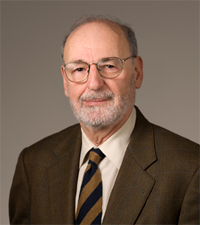News and Events
News Brief
NEI Laboratory Chief Receives Helen Keller Award for Vision Research
May 6, 2008
Joram Piatigorsky, Ph.D., chief of NEI's Laboratory of Molecular and Developmental Biology (LMDB), received the Helen Keller Award for Vision Research on April 29, 2008. The award, given each year since 1994, is presented by the Helen Keller Foundation for Research and Education for "significant contributions to vision science during the course of a career or for a single contribution of exceptional importance to vision science."

"I am very honored to receive this award," Dr. Piatigorsky said. "I am particularly pleased that this award, which is usually given to individuals who have a strong clinical direction to their work, is being given this year to a strictly basic scientist with broad interests who specializes on lens and cornea. I believe it is important to recognize and continue to support basic research, especially today when the focus is increasingly on goal-oriented translational research."
Dr. Piatigorsky has been chief of NEI's LMDB since 1981 and has published more than 275 papers in peer-reviewed journals. He has received noteworthy acclaim and many awards for his scientific achievements. Dr. Piatigorsky is widely sought after as a speaker, and has delivered many national and international invited lectures.
"I am delighted to see Joram receive this well-deserved award for his years of innovative research," said Paul A. Sieving, M.D., Ph.D., NEI director. "As the first researcher from NEI to receive this prestigious award, Joram admirably exemplifies the creativity and originality that characterize NEI's intramural research program. We are very proud of his achievements."
Christopher A. Paterson, Ph.D., D.Sc., co-chair of the prize selection committee, explained that the decision to award the prize to Dr. Piatigorsky was based on "his outstanding scientific contributions over the past 40 years," that have "opened the door to a new era of molecular and genetic vision research." Thom J. Zimmerman, M.D., Ph.D., the other selection committee co-chair, added, "Usually, when the committee meets there's lots of discussion about candidates. This time the whole committee recognized immediately that the choice of Dr. Piatigorsky was an excellent one needing no debate or discussion."
In his acceptance speech, Dr. Piatigorsky described his research as being "curiosity-driven." He explained how he was led from his early studies using proteins called crystallins as markers for how the cells in the eye's lens become more specialized to comparative studies on the differences between crystallins in vertebrates and invertebrates, and then to the nature of crystallins and the molecular basis for crystallin gene expression. Piatigorsky and his colleagues coined the term "gene sharing" to link multiple functions of a protein to the different expressions of its gene. In further research he generated the "refraction hypothesis," extending gene sharing to the cornea and conceptually linking lens and cornea by way of the multiple functions of corneal crystallins.
Citing his 2007 book, Gene Sharing and Evolution, Piatigorsky proposed that "gene sharing is a general strategy of evolution and a fundamental rule of biology that has numerous implications for medicine."
Dr. Piatigorsky received his award at a special ceremony held in conjunction with the annual meeting of the Association for Research in Vision and Ophthalmology (ARVO) in Fort Lauderdale, Fla. He received $30,000 as the monetary component of the award.

